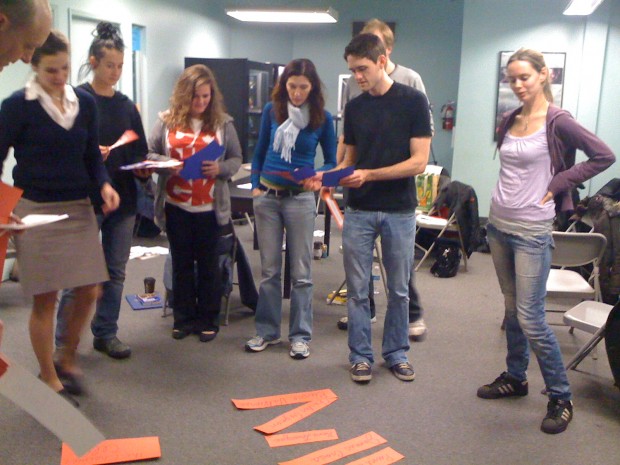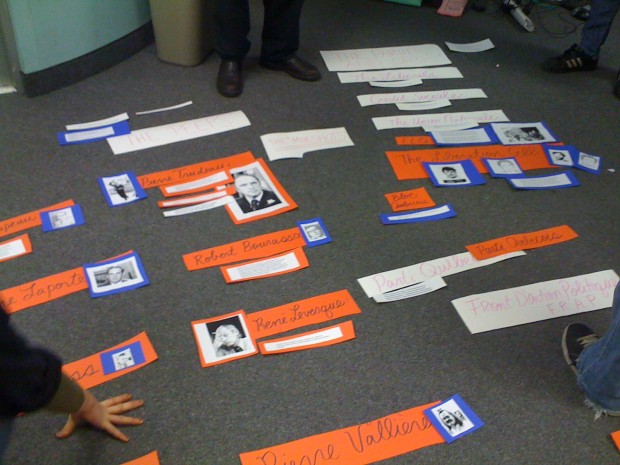Section 98 – Open Source Entry #2 – The Peeps, the Perps, the Parties, and the Mugshots
by Aislinn Rose
“I have this game I like to call ‘let’s find out how ignorant we are.‘” And with those words from Melissa we set out to complete the task she had prepared for us.
If you read our first Open Source Theatre entry, you’ll remember that our mapping exercise left us with a lot of questions that we felt needed answers for the next stage of our research. In effect, we chose the elements of greatest interest to us and doled out the homework assignments to our collaborators. There was one stipulation: the research presentations to be delivered the following week should be interactive and/or performative in some way.
Since the mapping exercise, we’ve had presentations on The FLQ Manifesto, public opinion and media coverage of the Progressive Arts Club and the FLQ, the connection between culture and politics, and many others. However, the prize for “most interactive” went to Melissa for her presentation on the FLQ and the October Crisis. Well, if there had been a prize it would have gone to Melissa.
Enter The Peeps the Perps, the Parties and the Mugshots.
That’s one hell of a comb over. Can you name this man?
Showing great form with the scissors and glue, Melissa handed us a stack of colour-coordinated photos, names, political parties, and pertinent paragraphs detailing the events surrounding the October Crisis of 1970. To begin, we had to lay out the names according to groups: the politicians in one group, the “perps” in another grouping and so on. As a true test to our ignorance, we were to complete these tasks using our own knowledge of the events in questions. No Wikipedia for iPhone allowed.
From there we had to try to match the “mugshots” to the names, the bios to the mugshots, and the descriptions to the appropriate political party and/or organization. The interactive nature of the presentation certainly led to spirited discussion, and a greater urge to get to know these people and understand their involvement. Once the items were laid out on the floor (and Melissa had corrected our mistakes), we took turns covering the various sections and presenting the material to the whole group. It represented a fairly significant amount of information.
A commenter on my first post, Margaret, asked the excellent questions, “what will you do to communicate these messages to an audience who today may be as ignorant as you were when your process began? Will we need to know as much as you in order to live this play’s story?” As I responded, this is absolutely an issue we are concerned about, and have been considering since the first iteration of this project.
We used a variation on chalk drawings (an aesthetic of the period we were exploring in Tim Buck 2) to explain the history of Section 98 of the Canadian Criminal Code “in 2 minutes or less”. Is there a similar aesthetic of the 1970’s that we can use to quickly fill in the blanks? What might we use for the modern era? The success of Jon Stewart’s The Daily Show certainly makes a strong argument for there being no need to talk down to our audiences.
On this topic of aesthetics, we’ve been looking into the the artistic responses to the events of these eras, and I want to share with you a song that Melissa remembers singing while traveling with a couple of French Canadians in BC.
The song is Réjean Pesant by Paul Piché. Researching it more recently, Melissa was surprised to find that she had been singing a separatist line: “We are not masters in our own home, because you are here”. You can find the lyrics in both French and English here.
The more we have come to understand the human side of the FLQ and the events surrounding the October Crisis, the harder it has become for us to define “what is a terrorist?”. I guess we shouldn’t feel too badly about this, as the UN doesn’t yet have an agreed upon definition either. As the aphorism goes, one man’s terrorist is another man’s freedom fighter. Even the United States Government used to refer to the Taliban as “Freedom Fighters“. Further discussions on the role and ethics of using violence to bring about political change has certainly forced us to abandon any clear-cut distinctions on the topic.





Delighted to get your “sharing”…but, probably not much good at making suggestions. Just keep me in the loop because I find this process fascinating & informative. The FLQ/ Rene Levesque period was between my 2 arrivals in Canada. The perspective in England was very one sided…it was an evil plot against the status quo. However, this reminds me more about the IRA and Northern Ireland ( Brits Vs.the evil Irish). IRA…were they freedom fighters or terrorists? What were they originally? How did they become “terrorists?”
Hey guys, this process is fascinating. Has anyone shared it yet on the Canadian Drama listserv? I think there are academics and others on that listserv that would be very interested in this process. Contact me and I’ll forward you the info.
Bridget (bmac)
Hi Mary! Interesting you should bring up the comparison between the FLQ and the IRA. This is something that we began discussing early in the research process, and if you go back to our first Open Source post, with the mapping exercise, you’ll see this picture posted (https://praxistheatre.com/wp-content/uploads/2010/01/Quebec-Politics-Photo.jpg) where we laid out some possible comparisons, such as the IRA to the FLQ, and CIA actions to those of the RCMP.
The IRA is a great example in our debate of freedom fighter vs. terrorist. Are they freedom fighters if we can relate to them… if we know people involved, and terrorists if they fall outside of our frame of reference? What are you thoughts?
Glad you’re interested in this process Bridget… and great idea about the listserv. I’ll be in touch!